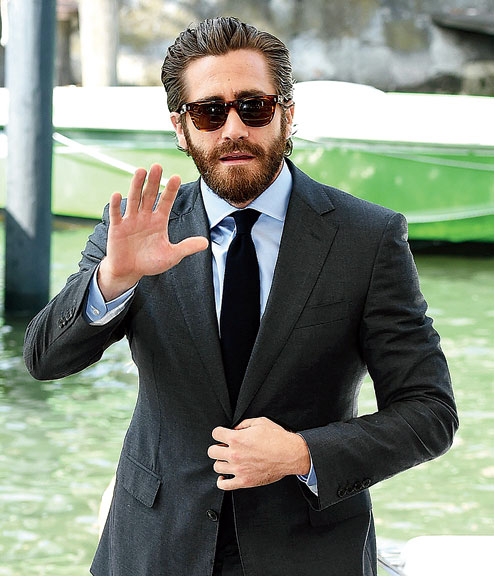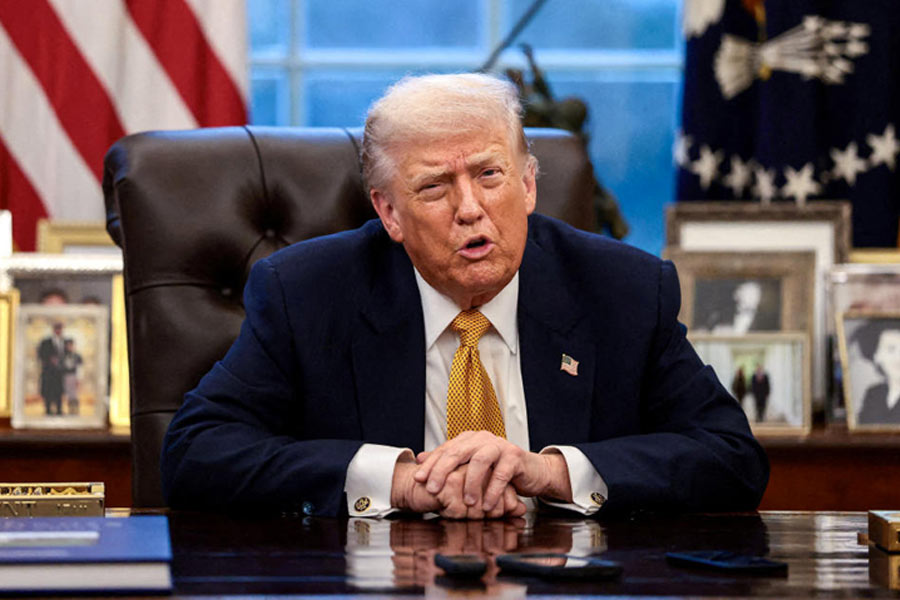
Jake Gyllenhaal is interested in my wife. We’re seated in high-backed, white-leather armchairs by a window overlooking Central Park. Now and again the actor leans forward and refills his water glass from a jug on the table between us. The rest of the time he sits erect, like a wise man in a Buddhist temple, pondering the meaning of his life’s work, not to mention my wife.
Gyllenhaal, 35, is dressed smartly in a dark blazer, a white shirt and blue jeans. His brown hair is long and floppy. He has a beard and his cheeks and chin have a perfect geometric regularity. The first thing you notice, though, is his startling, pale blue eyes, set off somehow by the wolfish incisors that flash out when he smiles.
Besides being one half, with his sister Maggie, of an emergent Hollywood dynasty, and besides, or rather because of, his day job anchoring a succession of well-regarded independent films — from Brokeback Mountain and Jarhead to the brilliant Source Code — Gyllenhaal is the thinking-woman’s heart-throb.
I would be more interested in your life with your wife now
He is said to have dated a succession of equally well-reviewed independent women, from Kirsten Dunst to Ruth Wilson and he is supposedly the subject of an entire Taylor Swift album, including the single We Are Never Ever Getting Back Together (from the album Red, 2012). The chap in the video for that song looks awfully similar, and the line You hide away and find your peace of mind with some indie record that’s much cooler than mine does sound like something he might do.
Gyllenhaal and his love life remain a fixation of gossip columnists across the land, partly because, in spite of their best efforts, he manages, mostly, to keep it to himself.
I tell Gyllenhaal he should prepare himself for some pretty searching questions. “Well, good luck,” he replies sportingly before returning to his theme. “I always want to get at something interesting,” he says. “You have mentioned your partner....”
I’d mentioned, in passing, a conversation I had with her about Gyllenhaal’s new film, Demolition. “I thought, ‘Oh, that’s great. They saw it together. What did they do afterwards? What did they have to eat?’ You know?”
I don’t think Gyllenhaal ever stops working. A few years ago, promoting another film, he asked one of my colleagues how he would feel if he lost his wife. Since then, Gyllenhaal has twice played men who lose their wives. You use these interviews to prep for your next movie, I say. “Yeah,” he replies, and chuckles.
As we speak, Gyllenhaal is working on a film about Jeff Bauman, one of the accidental heroes of the 2013 Boston Marathon bombing. A photograph of Bauman being rushed from the scene, one leg shredded off at the knee, the other not much better, went around the world. When he awoke a day later to find that he had lost his legs, he immediately signalled for a pen and paper and helped the FBI to identify one of the bombers. This, and the cheerful way he handled horrific injuries, made him one of the mascots of Boston’s recovery.
I covered the bombings and the frantic manhunt that followed, but Gyllenhaal’s film, Stronger, will not be about any of this. “It will be a love story about him and his new wife,” he said. “I would be more interested in your life with your wife. That’s what I’m interested in now.”
Demolition has the same broad themes. Gyllenhaal plays Davis Mitchell, an investment banker who works in the new World Trade Center and is married to his boss’s daughter. She is killed in a car accident. Reading the opening lines, Gyllenhaal thought: “I don’t think I can do another movie about a man who loses his wife, right?”
Yet the film immediately swerves from the expected course. Davis begins writing to the customer complaints representative of a vending machine company whose machine failed to vend a snack to him in a hospital waiting room. And he starts smashing things to see what is inside them.

In New York, when you do something crazy or outlandish, people tend to ignore you even more
Gyllenhaal has prepared for recent films with epic, body-morphing feats of physical training. I read that for Nightcrawler, in which he played a man who films grisly crime scenes for the local news, he achieved an emaciated, bulging-eyed appearance by running 15 miles a day and subsisting on kale. Is that true? “Yeah.... Most people thought I was nuts, and after seeing the movie most people do anyway,” he says. “But I just started doing it and it ended up feeling right.”
In this case, however, the director, Jean-Marc Vallee “demanded no preparation. He said: ‘Not this time for you. We are going to put you in a more uncomfortable place’.”
The darkest moment came when Vallee forced Gyllenhaal to dance in public during the morning rush hour in Manhattan. “I was terrified,” he says. Surely he has done musical theatre? There it is expected, he replies. It’s different at 8.30am on the platform of the Cortlandt Street subway station. No one seemed to notice, though. “In New York, when you do something crazy or outlandish, people tend to ignore you even more. People would walk straight past me.”
As his character, Davis, loosens up, he serves as a recklessly honest mentor to a teenage boy named Chris who is wrestling with his sexuality. Discussing the matter in the aisle of a hardware store, they conclude, together, that Chris is gay. Davis says he will be tortured for it at school and advises Chris to remain in the closet until he reaches adulthood, at which point he should go and live in San Francisco or Manhattan. It seems like an odd coda to Brokeback Mountain. “Yeah, people have qualms with that,” says Gyllenhaal, “but I think he’s looking out for him, in a way. I think he’s sort of saying: ‘There are realities.’”
Gyllenhaal himself went to an elementary school in Los Angeles, “where two of my teachers were openly gay. I just sort of grew up taking it for granted.”

I have a lot of very strong, very smart women in my life
His parents (Stephen Gyllenhaal and Naomi Foner) were filmmakers and their home was regularly filled with writers and actors. Gyllenhaal rolls his eyes. “The way journalists like to describe it, it sounds like a revolving door of celebrity. Like my parents were Hollywood psychics.”
That said, Jamie Lee Curtis was his godmother and Steven Soderbergh, albeit before he was a famous director, rented the room above their garage. Paul Newman came round too, and took the boy Gyllenhaal driving at a racetrack. “He was racing. He showed me some things in the car and stuff; it was pretty cool.”
People now compare you to Newman, I say. “Why? My god! Do not sully his name!”
His parents tried to limit their children’s film roles, insisting they take normal summer jobs. Yet Gyllenhaal was in City Slickers aged 11 and shot Donnie Darko with his sister when both were on the verge of adulthood.
Maggie “always seemed sort of bigger than life, just by nature of sort of being my sister”, he says. If you had asked him then if she was going to be a star, he would have said yes, but only because she was his older sister. “The real answer is no,” he says. “I certainly had no idea that I was heading in the direction of doing movies.”
Now that they are both in their 30s and still in Hollywood, he feels protective of her. “I know the differences between the way men and women are treated,” he says. And “the sort of insidious, subtle nature of sexism. I wasn’t so aware of it — it’s not so easy to see — but I have become aware of it. I have a lot of very strong, very smart women in my life.”
And you yourself are now widely regarded as the thinking-woman’s totty, I say. “Mmm.” And are you, um, available? “I thought you said you had a wife,” he says, and explodes with laughter. I might never have another chance like this, I say, laughing too.
Then he says he is indeed available. Do women write to you and think that you understand them, I ask. “No!” he says. “I have yet to get a letter from anyone who thinks I understand them.” Maybe you’ll get some now, I say. From readers of this paper. “Okay,” he says. He doesn’t offer his address.
So you are single, I say. He laughs again. “I already answered that question.” I’m asking twice because I wonder if he feels the need to be single and available, much as members of a boy band are supposed to remain so for the sake of their fan base.
“In that there is a conscious decision that I’m not at this moment in a relationship?” he asks. “That this is some sort of career choice?” Well, or maybe if you were in a relationship you would try not to talk about it.
There is now an entire generation that has been raised without a sense of privacy
“I think I made an unspoken agreement early in my career, without knowing it I guess, that some parts of what I do would be interesting to people — which is still sort of a bit absurd, knowing who I actually am and how boring I actually am.” He wanted a private life that remained walled-off from his professional life, partly for its own sake, he says.
“I also really believe in a character. I believe in the mystery of a character, and the creation of an actor as they do it. It’s fun. I think it should be fun for an audience to wait for another character. Even though we live in a different culture today, society wants to know everything and is desperate for information, just, you know, to be able to discard it for something else. But I have this old-school mentality that there is something fun in creating behind the curtain and then coming out and showing it.”
There is now “an entire generation that has been raised without a sense of privacy”, he says. “I often wonder what you have to bring to people if your own life is not your own. What wonderful things can you bring that you have learnt if everybody knows about all the stuff?”
Gosh. I’m afraid, paradoxically, that this speech only makes me more curious about what went down between him and Taylor Swift, a musician who carefully curates her private life and packages it into albums and Instagram shares.
But we’re out of time. He rises to go to the lavatory, and a lady escorts me out of the hotel room. A few journalists are sitting on chairs in the corridor, waiting to be examined by Gyllenhaal as part of his next piece of research on the human character.
Will Pavia
(The Times, London)
With Clooney taken, is Jake Gyllenhaal Hollywood’s most eligible bachelor? Tell t2@abp.in










